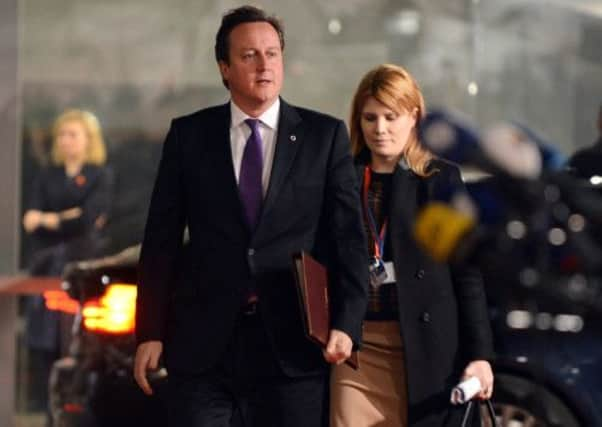Cameron demands Europe clamps down on migration


The Prime Minister has already faced stiff criticism from leading EU figures over his hopes of reform – although Germany and France are thought to be supportive – and was to attempt to build support for a shake-up over a dinner with premiers last night.
Creative measures must be found to prevent the pull that countries with higher living conditions have on residents in new states, he was set to tell the 25 leaders, including Germany’s Angela Merkel and European Commission president Jose Manuel Barroso, at the Eastern Partnership Summit in Lithuania capital Vilnius.
Advertisement
Hide AdAdvertisement
Hide AdMr Cameron plans to impose new restrictions on benefits for European Union nationals heading to Britain but wants wider EU reforms, such as a limit on labour movement from new member states until they hit a certain level of GDP per head.
“We need to face the fact that free movement has become a trigger for vast population movements caused by huge disparities in income,” he said.
“It is time for a new settlement which recognises that free movement is a central principle of the EU, but it cannot be a completely unqualified one.”
After a three-month period without welfare, EU nationals will only be able to claim out-of-work benefits for a maximum of six months, unless they can prove they have a genuine prospect of employment, under the plans announced on Wednesday.
New migrants will not be able to claim housing benefit immediately.
Those found begging or sleeping rough could be deported and barred from re-entry for 12 months unless they can show they have a proper reason to be in the UK, such as a job.
But Mr Cameron’s move sparked an EU backlash.
European employment commissioner László Andor called it an “unfortunate over-reaction” and cautioned the PM not to interfere with rules underpinning the European single market, while Mr Barroso warned that free movement was a “fundamental” EU principle.
“I had the occasion to underline to Prime Minister Cameron that free movement is a fundamental treaty principle that must be upheld,” Mr Barroso said.
“There is clear evidence of its economic benefits.
Advertisement
Hide AdAdvertisement
Hide Ad“But we are also aware of the challenges that this can also bring, particularly for local communities and services, and EU rules already include measures to prevent abuse.”
Meanwhile, the main business of the summit threatens to prove problematic as plans for a major trade deal between Ukraine and the EU appear to have been shelved under pressure from Moscow, although Georgia and Moldova are set to sign up to the agreement.
Target out of reach
A RISE in immigration from crisis-hit eurozone countries and a drop in people leaving the UK have pushed the government’s migration target further out of reach.
Figures revealed the first annual increase in the net flow of migrants to the country for two years.
While overall immigration fell, statisticians revealed a “statistically significant” surge in citizens arriving for work from the so-called EU15 nations, which include Portugal, Ireland, Italy, Greece and Spain.
Rising to 182,000 in the year to June, from 167,000 the previous year, net migration is moving further away from the government’s aim of slashing the figure to less than 100,000 before the next election in 2015.
Immigration Minister Mark Harper said net migration was still down by nearly a third since its peak in 2010 and insisted the government was working hard to bring it down further.
But migration experts warned it was looking “increasingly difficult” for the Prime Minister and home secretary to hit their goal.